Viewing Events
Use the Events page to review what happened with a vehicle. You can filter events, explore the route on a map and timeline, and export data.
Open the Events page:
- Go to Fleet → Vehicles → Table → Show Events for a vehicle, or
- From a vehicle’s Inspect page, select Events.
Looking up a specific event?
Use the icon or event name to identify it in the Events Reference lookup page.

Quick Start⚓︎
- Filter → pick Time Range and Event Type(s) → Apply Filter.
- Scan the List on the left → select an event.
- Map + Timeline focus your view.
- Detail Panel shows location, related events, raw data, and Initiated by.
- Export filtered results if you need to share.
Hide Vehicle States
In the filter, enable Hide Vehicle States (called Hide Trackings for CloudBoxx API customers) to focus on key changes.
Page Layout⚓︎
The Events page has four working areas you use together:
Event List (Left)⚓︎
- Sorted by newest first; scroll for older entries.
- Shows your active filters as tags.
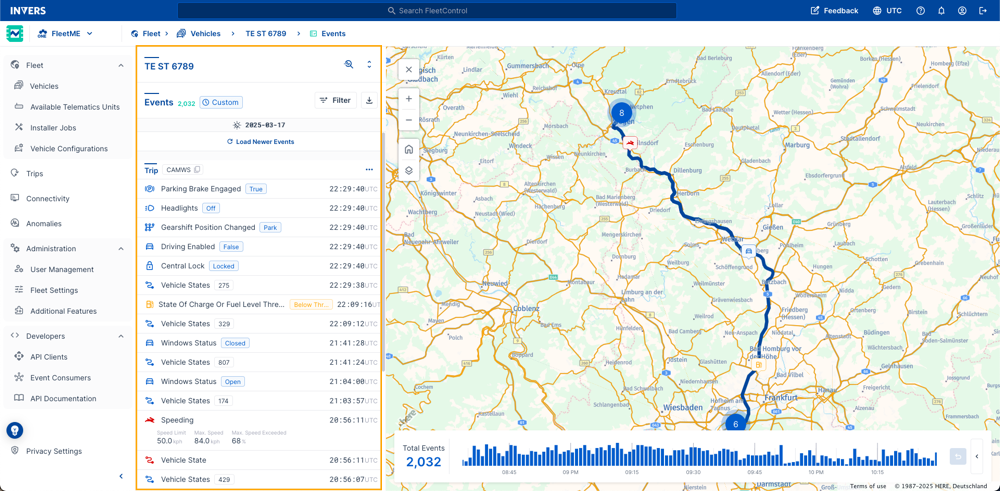
Map (Center)⚓︎
Displays events as points or as a route when tracking is available. Clustered dots indicate dense areas of events.
For map navigation controls (zoom, satellite view, POIs, home), see User Interface.
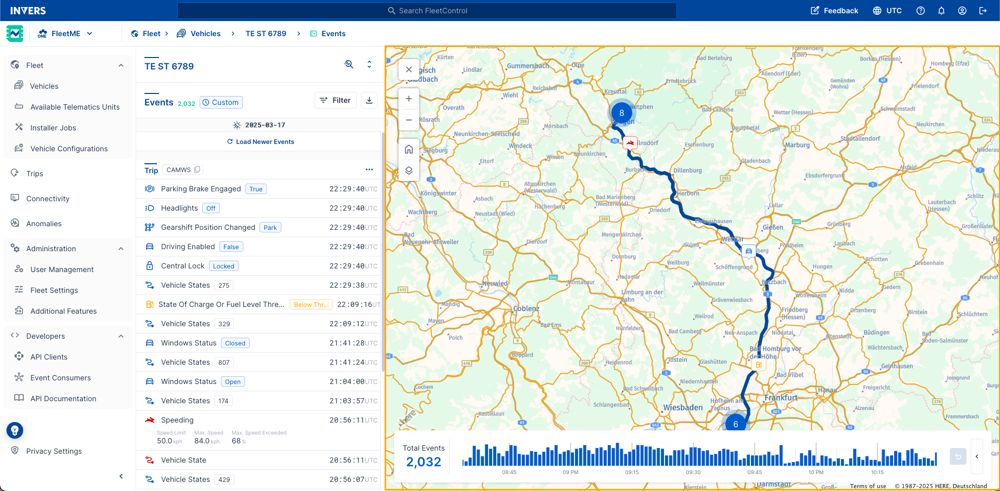
Timeline (Below Map)⚓︎
- Each bar is a time bucket for your filtered period.
- Select a bar to drill into a 5‑minute window; the map and list sync to that interval.
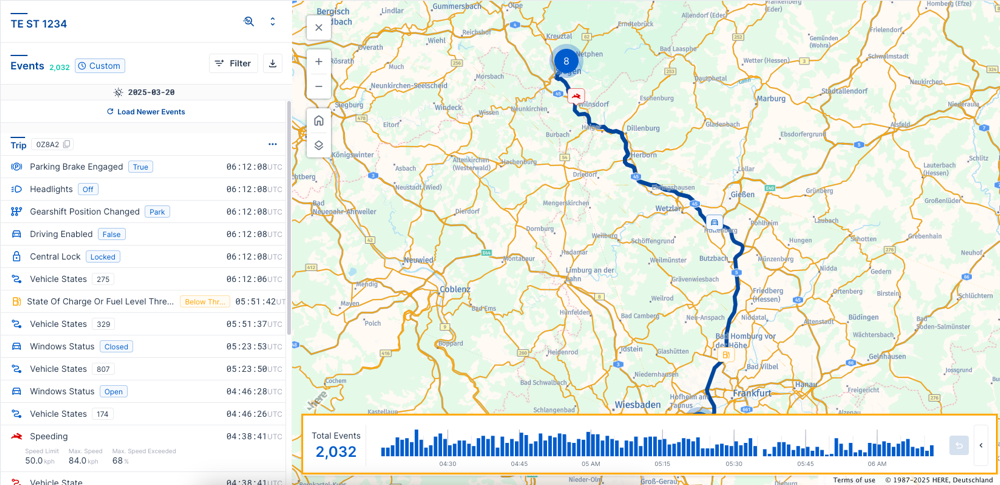
Detail Panel (Right)⚓︎
Opens when you select an event. For general information about side panels, see User Interface.
The panel shows:
- Selected Event — Reason and timestamp
- Linked Event — Related event (e.g., Vehicle State Recorded)
- Raw values — Speed, Mileage, State of Charge or Fuel Level, Central Lock, Driving Enabled, Ignition, Doors Status, Onboard Voltage, GNSS Speed over Ground, Supply Voltage
- Linked Commands — Commands sent within 5 minutes of the event
- Initiated by — Who or what triggered the action
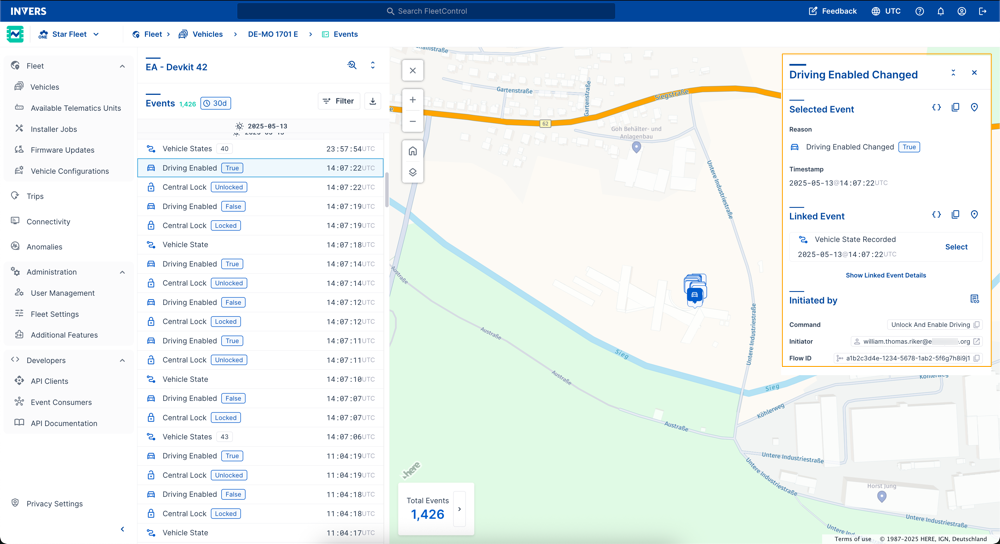
Filter⚓︎
Open Filter to control what you see. For general information about filtering, see User Interface.
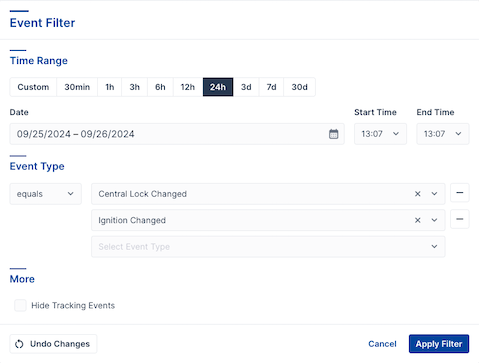
Filter options:
- Time Range: 30 min, 1 h, 3 h, 6 h, 12 h, 24 h, 3 d, 7 d, 30 d, or set a custom date + start/end time.
- Event Type: Add one or more event types.
- Hide Vehicle States (CloudBoxx API: Hide Trackings): Focus on key changes by hiding routine state updates.
Actions:
- Apply Filter — Run the search
- Undo Changes — Reset the modal
- Cancel — Close without applying
Find just the important changes
After choosing a time period, select only the event types you care about (e.g., Ignition Changed, Central Lock Changed). For a full list of event types, see Events Reference.
Initiated By⚓︎
The Initiated by section shows who or what triggered a vehicle command or event. Use this to answer questions like “Which user triggered Event X at Time Y?”
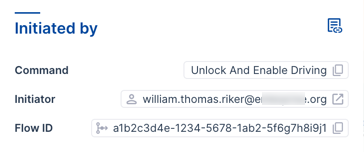
| Initiator | Description | Reference |
|---|---|---|
| User | FleetControl user action through the web interface. Shows user’s email address. Requires Fleet Users permission. | User Management |
| Client | API client command (e.g., booking app). Shows configured client name. Requires API Clients permission. | API Clients |
| Bluetooth | Bluetooth connection and direct CloudBoxx communication when cellular connectivity is weak in underground parking or dense urban areas. | Bluetooth Integration |
| RFID | Access card held to MultiCardReader to unlock or lock the vehicle. | RFID MultiCardReader |
| AutoImmoLock | CloudBoxx automation rules execute—for example, automatically locking the vehicle after a Bluetooth unlock. | Auto Immobilizer Control |
This event has no associated command or initiator.

In rare cases, initiator information is not available for an event. This is typically due to a timing issue with the automatic linking between events and commands. The event itself is logged correctly and does not indicate an issue with your fleet operations. If you would like this checked, contact support.
Linked Commands⚓︎
Sometimes commands and events occur close together. Select the lookup icon to open Linked Commands—this lists all commands sent within 5 minutes of the selected event. Use this to see the full context around an event, including related actions that happened before or after.
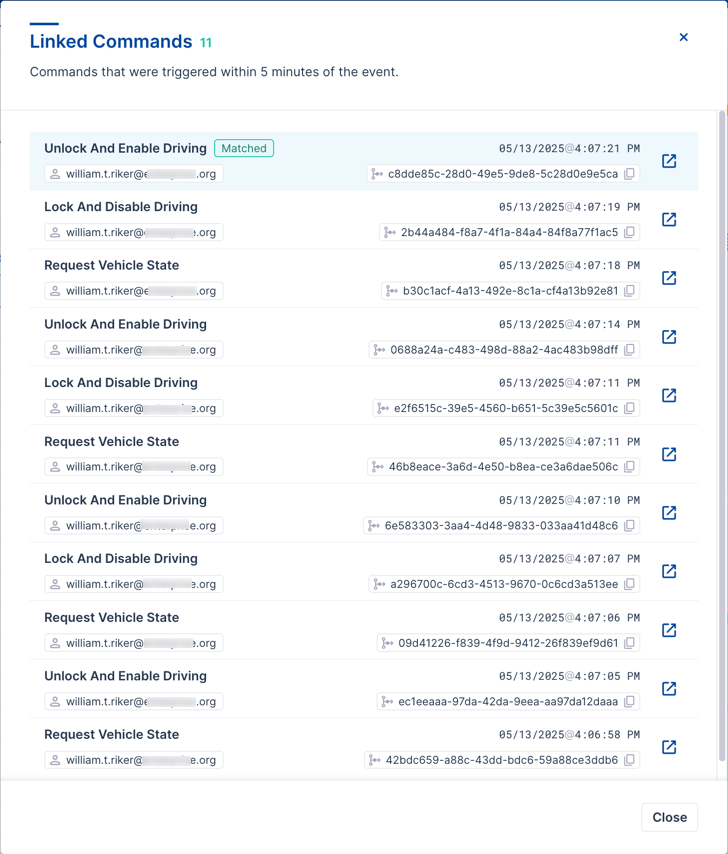
Exporting Data⚓︎
Export the currently filtered events and tracking data as a file—ideal for sharing with authorities or support teams. For general information about exporting, see User Interface.
- Select the Download icon next to Filter.
- In Event Export, select Export to compile and download.
- The file is saved to your browser’s downloads folder, named:
events_<vehicle-plate>_<date>_<time>.csv

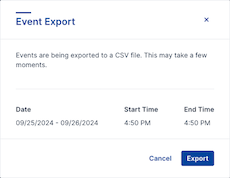
What gets exported?
The export includes all events matching your current filters (time range + event types + options).
Common Tasks⚓︎
Expand a category to view the example.
Find a specific lock/unlock incident
- Open Filter → set the Time Range around the suspected time.
- In Event Type, select Central Lock Changed (and optionally Driving Enabled Changed).
- Apply and review the list; select an event to see Initiated by and Linked Commands.
Review a trip segment with unusual activity
- Filter to the relevant day.
- In the Timeline, select the bar that covers the time the activity occurred.
- The map and list sync to that 5‑minute window.
Cut noise from tracking/state updates
- Open Filter.
- Enable Hide Vehicle States.
- Apply; you will see mainly change events.
Related Articles⚓︎
- User Interface — Maps, filters, side panels, and common controls
- Events Reference — Complete list of event types and vehicle states
- Inspect — Vehicle details, commands, and diagnostics
- Trips — Trip-based view of vehicle activity